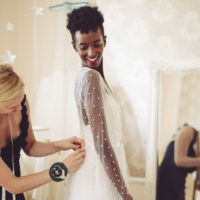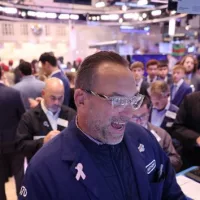
Eva-Katalin/iStock(NEW YORK) — With wedding season right around the corner and brides getting their big day dress selections in order, many are worried if the coronavirus may hold up their gowns.
The outbreak has created a global health emergency that has also begun to take a toll on many businesses, and retail industries are not exempt.
Eighty percent of the world’s wedding dresses are produced in Suzhou, China, according to BBC travel, and the wedding industry has been especially hit hard with factories being temporarily closed, which in turn means fabrics such as silk, chiffon and satin are not readily available.
However, there are companies finding ways to make sure that brides, as well as bridesmaids, still receive their dresses in time for their wedding.
Direct-to-consumer bridal and special-occasion dress company Azazie, which serves one in every 10 U.S. brides, reports that production times have been slightly delayed to nine weeks as opposed to the company’s standard six weeks. The company works with between 40 and 50 factories in China; those factories were closed for the Chinese New Year and re-opened four weeks later, as opposed to the two that were planned. Some employees were able to work at home, on items that require hand-work and beading, for instance. Although not all the factories in China were closed, some of the work that requires heavy machinery was outsourced to Cambodia and Vietnam.
Azazie also says that there has been an influx of traffic to its website as customers have been looking to fulfill last-minute dress needs since its merchandise is made-to-order and can be produced more quickly than traditional brick-and-mortar stores.
Other major retailers such as David’s Bridal claim that the coronavirus has not affected the flow of supply chain for their customer orders.
The bridal and special-occasion brand explained in a press release that its proprietary supply chain and broad selection of in-store and distribution center inventory has kept the company in a unique position to guarantee customer orders.
David’s Bridal carries over 300,000 bridal gowns and a broad assortment of bridesmaid’s dresses which are available for customers to shop and take home immediately.
There have also been plans to continue air-freighting gowns as needed to ensure that orders arrive in time for big events.
“We know how stressful a delayed order can be to a bride, so I’m here to unequivocally say that every customer will have the dress of her dreams in time, before her event date,” David’s Bridal CEO Jim Marcum affirmed in a statement.
The company has also confirmed that all of its factories — approximately half are located in China — are open for business as usual.
Co-owner and CEO of Kleinfeld Bridal Ronnie Rothstein also tells “Good Morning America” that the upscale bridal boutique known for its large selection has not been worried about the impacts of coronavirus on the flow of its delivery service.
The popular bridal store, also known for its television presence on “Say Yes to the Dress” purchases dresses from 71 designers, and only seven of those designers have their dresses made in China.
“Those seven are some of the most prominent manufacturers in the worldwide bridal industry,” says Rothstein. “They have confirmed that they will be shipping all dresses from China on a timely basis.”
Rothstein also advises that a few of the designers from China have opted to hold off on taking rush orders for brides who are getting married within 90 days as that’s usually the amount of time a manufacturer in China needs for production.
“We have been monitoring delivery dates since 1941, and we have never missed a wedding,” Rothstein adds. “We trust what our manufacturers are telling us.”
Copyright © 2020, ABC Audio. All rights reserved.















